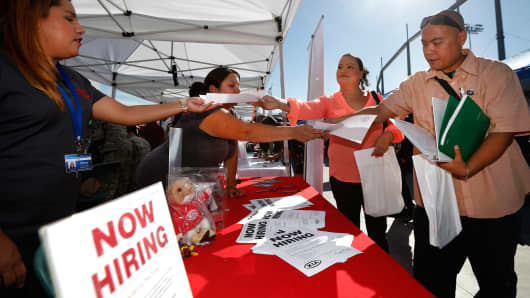It's still all about jobs and wages.
Despite Friday's surprisingly strong employment report — showing a gain of 271,000 new jobs last month — much of the recent presidential campaign has focused on widespread voter anxiety about their jobs and paychecks.
Even as the jobless rate has fallen to 5 percent — from double that level during the depths of the Great Recession — many Americans report a sense of uncertainty about their economic future. Despite the steady pickup in hiring over the last six years, wage growth has been sluggish, barely keeping up with inflation for most households.
So voters are listening carefully to the pronouncements from presidential candidates about which party offers the better proposals to boost job growth and wages.
Read More Broken promises: Candidates struggle to deliver manufacturing jobs
For the most part, the Republican candidates have focused on cutting regulations to free up small businesses to expand their payrolls and cutting taxes to put more money into consumer's paychecks.
"You think about the regulatory cost and the tax cost — that's why small businesses are closing, rather than being formed in our country right now," former Florida Gov. Jeb Bush said in the last GOP debate.
Read MoreSmall-business slowdown holds back global recovery
Bush is right that the pace of small-business hiring — once the biggest contributor to job growth in the U.S. — has fallen across the developed world.
But it's not clear how much of the blame can be placed on government regulations. Some economists have pointed to tighter credit since the Great Recession and a relatively weak recovery that has dampened the overall appetite for risk-taking by businesses large and small.



